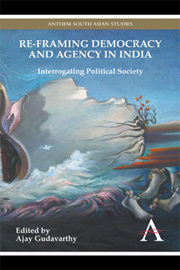Book contents
- Frontmatter
- Contents
- Preface and Acknowledgements
- List of Tables
- Chapter 1 Introduction: Why Interrogate Political Society?
- Part I Political Society and Protest Politics
- Chapter 2 Political Society in a Capitalist World
- Chapter 3 Antinomies of Political Society – Implications of Uncivil Development
- Chapter 4 Civil Society and the Urban Poor
- Chapter 5 Contentious Politics and Civil Society in Varanasi
- Chapter 6 The Politics of a Political Society
- Part II Political Society, Middlemen and Mobility
- Part III Civil Society and/or Political Society
- Part IV Rejoinder
- List of Contributors
Chapter 5 - Contentious Politics and Civil Society in Varanasi
from Part I - Political Society and Protest Politics
Published online by Cambridge University Press: 05 June 2012
- Frontmatter
- Contents
- Preface and Acknowledgements
- List of Tables
- Chapter 1 Introduction: Why Interrogate Political Society?
- Part I Political Society and Protest Politics
- Chapter 2 Political Society in a Capitalist World
- Chapter 3 Antinomies of Political Society – Implications of Uncivil Development
- Chapter 4 Civil Society and the Urban Poor
- Chapter 5 Contentious Politics and Civil Society in Varanasi
- Chapter 6 The Politics of a Political Society
- Part II Political Society, Middlemen and Mobility
- Part III Civil Society and/or Political Society
- Part IV Rejoinder
- List of Contributors
Summary
How do interest groups and associations representing people at different class levels make demands upon the state in India? Do lower-class associations resort to electoral politics more than middle- and upper-class associations? Do they tend to use more confrontational tactics than middle-class associations? Are middle-class associations more cooperative with the state, preferring to ‘operate’ rather than ‘agitate’, as John Harriss finds? Are their demands made in a more orderly, contained fashion? And what do these patterns of engagement with the state tell us about ‘civil society’ in India? Need we make a distinction between the orderly, bourgeois civil society of Western political theory and a more contentious, lower-class ‘political society’?
A study of occupational associations in Varanasi can shed some light on these questions. We examine and compare the means by which associations representing four occupational groups at two different class levels – boatmen and weavers, representing lower-class occupations, and traders and lawyers, representing middle-class occupations – make demands upon the state. First, we find that the associations representing the middle-class occupations were far more contentious in making their demands, carrying out a much higher number of protests and strikes, than associations representing the lower-class occupations. Associations representing the interests of lower-class occupations tended to prefer formal, institutionalized, or more contained means of making demands upon the state. These methods are not only less costly and less risky, but also less efficient and more time-consuming in the long run.
- Type
- Chapter
- Information
- Re-framing Democracy and Agency in IndiaInterrogating Political Society, pp. 93 - 124Publisher: Anthem PressPrint publication year: 2012

